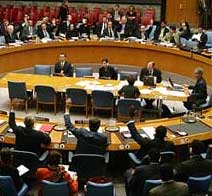By David Heller (Posted: February 6, 2009)
At the upcoming United Nations Environmental Program (UNEP) Governing Council meeting in Nairobi, Kenya, delegates will have the unprecedented opportunity to extend the adoption of important principles – a peoples’ right to access information, participate in their government’s decision making process, and seek redress in matters affecting the environment – to states around the world. But in preliminary negotiations, not all delegations were sanguine about committing to spread the codification of these principles globally.
In 2008, a select group of high-level external experts and judges, in consultation with the UNEP secretariat, was formed to draft principled guidelines that direct developing countries in the creation of national legislation protecting these access rights.
But alone, these guidelines can not compel state action. So the UNEP secretariat also drafted a complementary resolution, on how the Council should act upon the principles and work to ensure states reflect them in new law.
As it’s currently written, the draft resolution is that the Council:
Decides to adopt the guidelines for the development of national legislation on access to information, public participation and access to justice in environmental matters as set out in the [guidelines]… [Emphasis added]
Adoption of the guidelines by the Council would be a very positive, symbolic step for UNEP and the spread of the access principles. But, this language is not immune from alteration, and indeed, has already been compromised.
During preliminary discussions, several delegations, allegedly including the American contingent, expressed interest in replacing “adopt” with “take note of,”a subtle proposal with profound implications for the strength of UNEP’s commitment.
It is imperative that this change not occur.
If the Council were to merely “take note of” the guidelines, then they would be sending the wrong message to member countries: that it would be sufficient for all to do the same. While “adoption” implies an unequivocal recognition that the guidelines are desirable and binding, “taking note of” is pleasantly ambiguous and leaves far too much room for them to be ignored. The Council, by “taking note” of the guidelines, would simply be recognizing that they exist; a far cry from guaranteeing that the guidelines serve their namesake’s purpose and direct future action: a small but far from trivial distinction.
This proposed change will not go unopposed. The Access Initiative (TAI) has been working hard to leverage its influence and keep the language unmolested. Attending the meeting in Nairobi and advocating on TAI’s behalf will be Mr. Augustine Njamnshi, TAI coordinator in Cameroon, and part of the official UNEP Cameroonian delegation.
TAI has also harnessed support from its allies in the Irish and Argentine delegations, who share its concern over the dilution of the original language and will be advocating for the Council to remain committed to adoption, as the initial draft explicitly recommends.
The American delegation’s alleged complicity to the proposed change was particularly alarming. Given the Obama administration’s newfound commitment to promoting transparency and public participation in its own government, it appears as though the sea change in U.S. politics has not yet filtered down to affect the composition nor stance of its Nairobi delegation. But surely they must have been briefed on their new boss’s priorities. It’s baffling as to why the State Department Officials, representing the new administration, might be willing to water down stronger language when they arrive at the negotiating table.
Not only would U.S. support of weak language be inconsistent with its existing commitments, the U.S. delegation should consider its snowballing effects. Other nations, particularly China, will be emboldened by any U.S. disapprobation of the existing recommendations, making efforts to spread access principles beyond parties to the Aarhus Convention that much more challenging.
If any change is to be made to the initial draft of the proposed action document, it should include language that commits delegates towards creating a proper convention in the future – similar to the existing Aarhus Convention, but global in scope. Because the Aarhus parties are strictly European and Central Asian in origin, creating a similar scheme in Nairobi, where both developed and developing countries will have a presence, would be a step towards globalizing access principles. And that is an ideal that all delegations ought to be striving towards.

